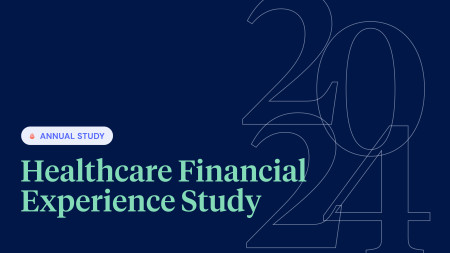Nearly Half of Consumers Report Their Healing Has Been Directly Impacted by Difficulty Paying Medical Bills

NEW YORK, September 19, 2023 (Newswire.com) - Rising healthcare expenses, lack of certainty over costs and financial support and poor coordination between providers and payers have caused consumers to feel more stressed than ever before about their healthcare bills. According to the 2024 Healthcare Financial Experience Study, 72% of consumers cite affordability as the biggest challenge to paying larger healthcare bills—not that they don't want to. What's more is that struggling to afford healthcare bills can directly impact consumers' recovery from their hospital visit, with 47% saying their well-being or healing has been negatively impacted by difficulty paying a healthcare bill. The annual study was commissioned by Cedar, an enterprise financial engagement platform that improves the end-to-end journey for consumers, and conducted by EI Studios, the custom division of The Economist Group, and fielded via online methodology among over 1,200 U.S. consumers.
"Healthcare costs continue to increase, and as most large employers are self-insured, the impact to them has been considerable," said Vincent Tammaro, chief financial officer at The Ohio State University Wexner Medical Center, who was interviewed for the report. "As a result, over the last 10 years, many of these self-insured employers have in turn asked their employees to share a larger portion of those costs. On average, even folks who are insured through some type of employer plan are ultimately paying about 30-33% of their healthcare costs. I think that is really contributing to a lot of the angst from a patient/consumer standpoint."
Watching healthcare costs grow is stoking major fears, yet consumers can't access—or are simply unaware—of the financial assistance resources available to them. Despite almost two-thirds (63%) not being able to pay more than $750 out-of-pocket for unexpected costs, the same percentage do not know what financial assistance options are available.
With well over half (58%) of consumers saying they find paying for a healthcare bill stressful, providers alone cannot fix this broken system. The 2024 report underscores the need for payers, providers and financial institutions to come together and make the financial experience in healthcare simpler and more affordable. Seventy-one percent of consumers find reconciling a billing issue between their payer and provider stressful, and four in 10 will not pay their bill if they cannot understand the administrative experience.
Organizations that invest in consumer-first technology are more likely to see their bottom line improve as consumers are more likely to resolve their bills faster, and are more likely to return. More than half (58%) of consumers have returned to providers due to a positive billing experience, while more than one-third (38%) have switched providers due to a negative billing experience. This trend is even more pronounced when payers and providers work together, as the overwhelming majority (94%) of consumers say that coordination on billing and payment between their provider and payer is an important factor in their decision to return to a provider in the future.
Consumers demand more financial support and certainty:
- 59% of consumers are worried about paying their healthcare bills over the next year
- 23% of consumers say they would not be able to pay more than $250 for a surprise bill
- 71% of consumers would be more likely to apply for financial assistance if they were provided clear/accessible options
Consumers struggle to navigate a fragmented ecosystem:
- 73% of consumers wish they could view real-time benefits information (such as their remaining deductible) in the same place as their provider bills
- 28% of consumers have delayed paying a bill because they were confused about their insurance benefits
- 34% of consumers have been put off using their health benefit accounts due to a bad experience
Consumers stay loyal when billing is transparent and easy:
- 96% of consumers say that coordination on billing and payment between their provider and payer is important to their overall satisfaction with their payer
- 49% of consumers have left a positive review for their provider if they had a good billing experience
- 43% of consumers say they would be more likely to pay their bills faster if they were provided with clear explanations about how deductibles and out-of-pocket maximums impact the bill
"This is our fourth analysis of the consumer's financial experience in healthcare, and the findings point to a clear theme: consumers want to pay their bills and resolve their financial responsibilities, but their bills are too expensive and the process is too complicated," said Florian Otto, CEO and Co-founder of Cedar. "With 100 million Americans currently struggling with medical debt, the status quo of consumer confusion and stress should not be accepted. The healthcare ecosystem must work together to empower consumers, as inaction clearly has a negative impact on patient, provider and payer outcomes."
For the complete results of the 2024 Healthcare Financial Experience Study, download the report here.
About Cedar
Cedar is committed to improving the healthcare financial experience for all. With an innovative platform that connects providers and payers, Cedar empowers healthcare consumers with an optimized journey—all powered by data science and interactive design. For Cedar clients, this leads to increased payments, more efficient operations and greater consumer loyalty. To learn more about why leading U.S. healthcare organizations trust Cedar to manage the end-to-end consumer experience from pre-registration to post-visit billing, visit www.cedar.com and join us on LinkedIn, Twitter, Facebook and YouTube.
Source: Cedar
